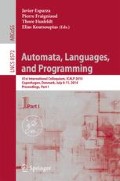Abstract
We study online algorithms for the Canadian Traveller Problem (CTP) introduced by Papadimitriou and Yannakakis in 1991. In this problem, a traveller knows the entire road network in advance, and wishes to travel as quickly as possible from a source vertex s to a destination vertex t, but discovers online that some roads are blocked (e.g., by snow) once reaching them. It is PSPACE-complete to achieve a bounded competitive ratio for this problem. Furthermore, if at most k roads can be blocked, then the optimal competitive ratio for a deterministic online algorithm is 2k + 1, while the only randomized result known is a lower bound of k + 1.
In this paper, we show for the first time that a polynomial time randomized algorithm can beat the best deterministic algorithms, surpassing the 2k + 1 lower bound by an o(1) factor. Moreover, we prove the randomized algorithm achieving a competitive ratio of \(\big(1+ \frac{\sqrt{2}}{2} \big)k +1\) in pseudo-polynomial time. The proposed techniques can also be applied to implicitly represent multiple near-shortest s-t paths.
Supported by NSC Grant 102-2221-E-007-075-MY3 and KAKENHI 23240002.
Access this chapter
Tax calculation will be finalised at checkout
Purchases are for personal use only
Preview
Unable to display preview. Download preview PDF.
References
Bar-Noy, A., Schieber, B.: The Canadian traveller problem. In: Proc. of the 2nd ACM-SIAM Symposium on Discrete Algorithms (SODA), pp. 261–270 (1991)
Ben-David, S., Borodin, A.: A new measure for the study of online algorithms. Algorithmica 11(1), 73–91 (1994)
Bender, M., Westphal, S.: An optimal randomized online algorithm for the k-Canadian traveller problem on node-disjoint paths. Journal of Comb. Opt. (2013) (published online)
Borodin, A., El-Yaniv, R.: Online computation and competitive analysis. Cambridge University Press, Cambridge (1998)
Dijkstra, E.W.: A note on two problems in connexion with graphs. Numerische Mathematik 1(1), 269–271 (1959)
Eppstein, D.: Finding the k shortest paths. SIAM Journal on Computing 28(2), 652–673 (1998)
Frieder, A., Roditty, L.: An experimental study on approximating K shortest simple paths. In: Demetrescu, C., Halldórsson, M.M. (eds.) ESA 2011. LNCS, vol. 6942, pp. 433–444. Springer, Heidelberg (2011)
Hershberger, J., Maxel, M., Suri, S.: Finding the k shortest simple paths: A new algorithm and its implementation. ACM Trans. on Algorithms 3(4), 45 (2007)
Huang, Y., Liao, C.S.: The Canadian traveller problem revisited. In: Chao, K.-M., Hsu, T.-s., Lee, D.-T. (eds.) ISAAC 2012. LNCS, vol. 7676, pp. 352–361. Springer, Heidelberg (2012)
Kao, K.H., Chang, J.M., Wang, Y.L., Juan, J.S.T.: A quadratic algorithm for finding next-to-shortest paths in graphs. Algorithmica 61, 402–418 (2011)
Katoh, N., Ibaraki, T., Mine, H.: An efficient algorithm for k shortest simple paths. Networks 12(4), 411–427 (1982)
Krasikov, I., Noble, S.D.: Finding next-to-shortest paths in a graph. Information Processing Letters 92, 117–119 (2004)
Lalgudi, K.N., Papaefthymiou, M.C.: Computing strictly-second shortest paths. Information Processing Letters 63, 177–181 (1997)
Papadimitriou, C.H., Yannakakis, M.: Shortest paths without a map. Theoretical Computer Science 84(1), 127–150 (1991)
Sleator, D., Tarjan, R.E.: Amortized efficiency of list update and paging rules. Communications of the ACM 28, 202–208 (1985)
Westphal, S.: A note on the k-Canadian traveller problem. Information Processing Letters 106, 87–89 (2008)
Xu, Y.F., Hu, M.L., Su, B., Zhu, B.H., Zhu, Z.J.: The Canadian traveller problem and its competitive analysis. Journal of Comb. Opt. 18, 195–205 (2009)
Author information
Authors and Affiliations
Editor information
Editors and Affiliations
Rights and permissions
Copyright information
© 2014 Springer-Verlag Berlin Heidelberg
About this paper
Cite this paper
Demaine, E.D., Huang, Y., Liao, CS., Sadakane, K. (2014). Canadians Should Travel Randomly. In: Esparza, J., Fraigniaud, P., Husfeldt, T., Koutsoupias, E. (eds) Automata, Languages, and Programming. ICALP 2014. Lecture Notes in Computer Science, vol 8572. Springer, Berlin, Heidelberg. https://doi.org/10.1007/978-3-662-43948-7_32
Download citation
DOI: https://doi.org/10.1007/978-3-662-43948-7_32
Publisher Name: Springer, Berlin, Heidelberg
Print ISBN: 978-3-662-43947-0
Online ISBN: 978-3-662-43948-7
eBook Packages: Computer ScienceComputer Science (R0)

